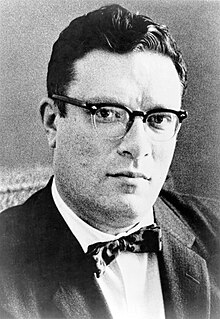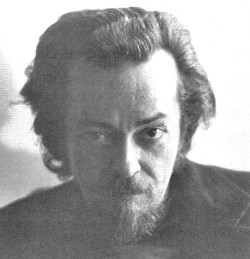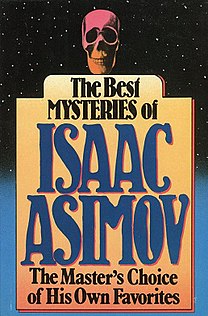Related Research Articles

Isaac Asimov was an American writer and professor of biochemistry at Boston University. He was known for his works of science fiction and popular science. Asimov was a prolific writer, and wrote or edited more than 500 books. He also wrote an estimated 90,000 letters and postcards.

The Robot series is a series of 37 science fiction short stories and six novels by American writer Isaac Asimov, featuring positronic robots.
Lester del Rey was an American science fiction author and editor. He was the author of many books in the juvenile Winston Science Fiction series, and the editor at Del Rey Books, the fantasy and science fiction imprint of Ballantine Books, along with his fourth wife Judy-Lynn del Rey.

Linwood Vrooman Carter was an American author of science fiction and fantasy, as well as an editor, poet and critic. He usually wrote as Lin Carter; known pseudonyms include H. P. Lowcraft and Grail Undwin. He is best known for his work in the 1970s as editor of the Ballantine Adult Fantasy series, which introduced readers to many overlooked classics of the fantasy genre.
"Blind Alley" is a science fiction short story by American writer Isaac Asimov. It was first published in the March 1945 issue of Astounding Science Fiction, and later included in the collection The Early Asimov (1972).
The Black Widowers is a fictional men-only dining club created by Isaac Asimov for a series of sixty-six mystery stories that he started writing in 1971. Most of the stories were first published in Ellery Queen's Mystery Magazine, though a few first appeared in Fantasy & Science Fiction, Isaac Asimov's Science Fiction Magazine, and the various book collections into which the stories were eventually gathered.
This is a list of short stories by American writer Isaac Asimov. Asimov is principally known for his science fiction, but he also wrote mystery and fantasy stories.
"Author! Author!" is a fantasy short story by American writer and scientist Isaac Asimov.

Azazel is a character created by Isaac Asimov and featured in a series of fantasy short stories. Azazel is a two-centimeter-tall demon, named after the Biblical demon.
"No Refuge Could Save" is a short story by Isaac Asimov. It is the second of Asimov's Union Club mystery stories, and the first to be anthologised in The Union Club Mysteries. Overall these mysteries are not rated highly, but this is considered to be one of the best in the series. It first appeared in the September 1980 issue of Gallery under the title "To Spot A Spy".

More Tales of the Black Widowers is a collection of mystery short stories by American author Isaac Asimov, featuring his fictional club of mystery solvers, the Black Widowers. It was first published in hardcover by Doubleday in October 1976, and in paperback by the Fawcett Crest imprint of Ballantine Books in November 1977. The first British edition was issued by Gollancz in April 1977.

The Union Club Mysteries is a collection of mystery short stories by American author Isaac Asimov featuring his fictional mystery solver Griswold. It was first published in hardcover by Doubleday in 1983 and in paperback by the Fawcett Crest imprint of Ballantine Books in 1985.
Michael Joseph Cassutt is an American television producer, screenwriter, and author. His notable TV work includes producing or writing, or both, for The Outer Limits, Eerie, Indiana, Beverly Hills, 90210, and The Twilight Zone. In addition to his work in television, Cassutt has written over thirty short stories, predominately in the genres of science fiction and fantasy. He has also published novels, including the 1986 The Star Country, the 1991 Dragon Season, the 2001 Red Moon and the 2011 Heaven's Shadow, in collaboration with David S. Goyer. In addition, Cassutt contributes non-fiction articles to magazines and is the author of the non-fiction book, The Astronaut Maker, a biography of NASA legend George W. S. Abbey (2018).

The Best Mysteries of Isaac Asimov is a collection of mystery short stories by American author Isaac Asimov. It was first published in hardcover by Doubleday in 1986, and in paperback by the Fawcett Crest imprint of Ballantine Books in September 1987.

The Asimov Chronicles: Fifty Years of Isaac Asimov is a collection of short science fiction stories, mystery stories and science essays by American writer Isaac Asimov, published by Dark Harvest in May 1989.
"The Ultimate Crime" is a short story by Isaac Asimov, dealing with a minor aspect of one of the Sherlock Holmes stories of Sir Arthur Conan Doyle. It is the 24th of Asimov's Black Widowers mystery stories, and it appeared in his anthology More Tales of the Black Widowers, which collects the second dozen stories of the series. It was written specially for that book. It subsequently appeared again in Sherlock Holmes Through Time and Space, an anthology of stories written by different authors and co-edited by Asimov, and Another Round at the Spaceport Bar.
In a writing career spanning 53 years (1939–1992), science fiction and popular science author Isaac Asimov (1920–1992) wrote and published 40 novels, 383 short stories, over 280 non-fiction books, and edited about 147 others.

"Nothing in the Rules" is a contemporary fantasy story by American writer L. Sprague de Camp.
Truth to Tell is a 1972 short story by Isaac Asimov. It is one of Asimov's series of stories about the Black Widowers, a gentlemen's dining club that meets monthly to solve mysteries and puzzles. It was first published in the October 1972 issue of Ellery Queen's Mystery Magazine under the title "The Man Who Never Told A Lie", and was included in the 1974 collection Tales of the Black Widowers.

Opus 300 is a collection by American writer and scientist Isaac Asimov. It was published by Houghton Mifflin in the United States in 1984, and by Robert Hale Ltd in the United Kingdom in 1985. Asimov chose to celebrate the publication of his three hundredth book by writing about his previous 99 books, including excerpts from short stories and novels, as well as nonfiction articles and books. Opus 300 also includes nine complete stories, several complete science essays, and one complete essay never before published, "The Forever Generation," which is not available anywhere else.
References
- ↑ Azazel (Doubleday: 1988), Introduction